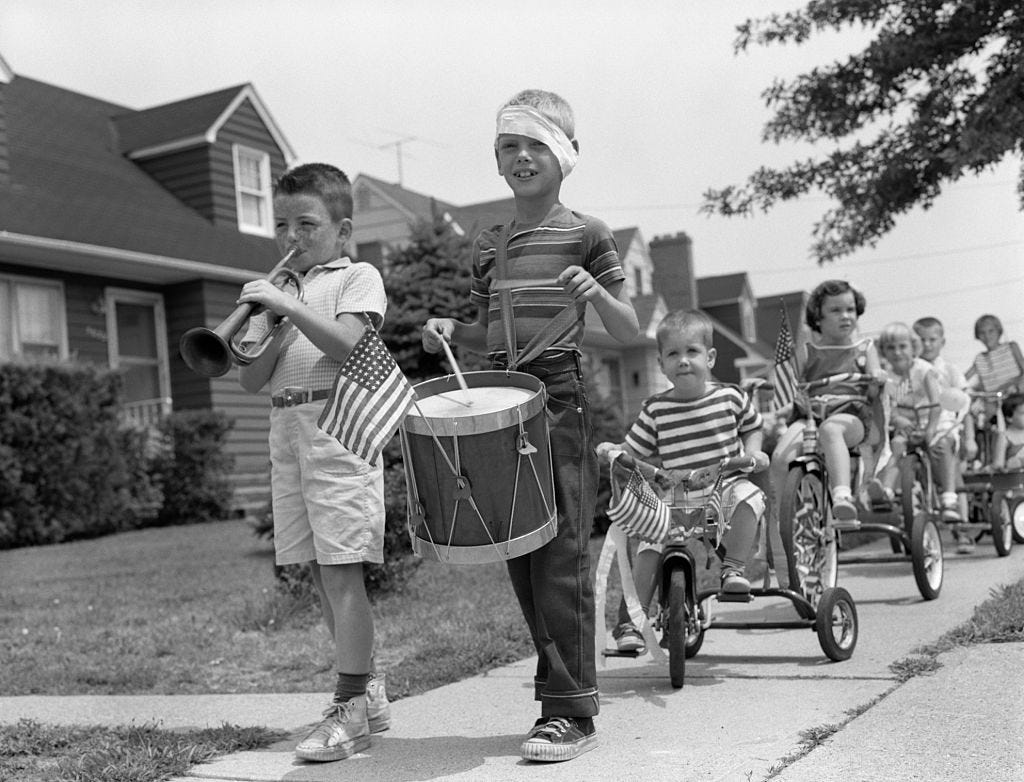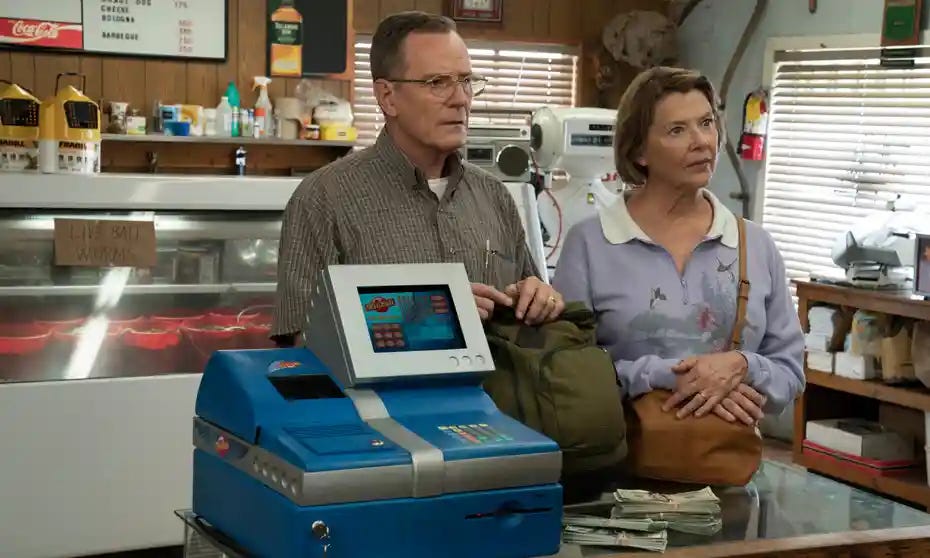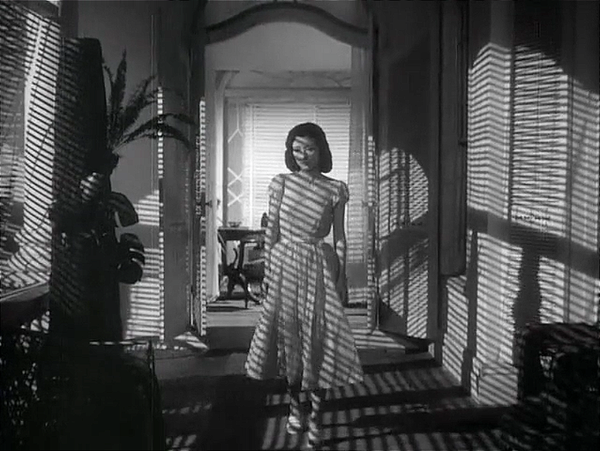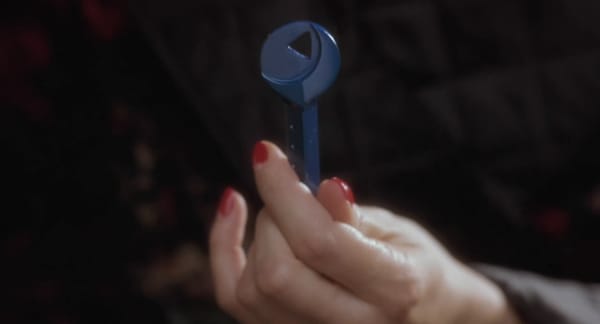Jerry and Marge Go to the Revolution
Some thoughts on July 4th, the American flag, and the limits of patriotism.


It’s the 5th of July, 2022, the day after Independence Day and the day after the 309th mass shooting in America this year. I don’t know how you felt about this country yesterday, before or after you heard the news of what happened in Highland Park, Illinois. To be honest, I found it hard to look at flags all weekend, even though they were everywhere. I did the usual Fourth of July things: I grilled, I spent time with loved ones, I went to a small-town fireworks display. I watched a movie about two older people – i.e., people my age – keeping their chins above water by playing the lottery. And I wondered what happened to the country I grew up in, because that country has vanished behind the barbed wire of fear, fury, and delusion, and I don’t think it’s coming back.
I should say that my relationship with the American flag has always been a complicated one. As a child of the 1960s, growing up on the East Coast with older siblings and their peers protesting an unpopular war, it has been to me an especially fraught symbol, reflecting our best, most inclusive ideas of what a society of humans can look like while also embodying some of our least admirable traits and histories: Racism, jingoism, parochialism, misadventures at home and abroad. In the interplay between those red and white stripes, you can glimpse the eternal American struggle between repressing and punishing the attributes that mark us as unique individuals and celebrating those differences as the holy stuff of life.
Thanks for reading Ty Burr's Watch List. This post is public so feel free to share it.
I learned when I was young that people who display a US flag as a statement about who they believe they are exist on a spectrum. At one end are those who see it as a promise – to live up to and beyond the principles and opportunities stated in our founding documents, to allow everyone into the experiment. In that promise is an expectation of uncovering and understanding the truth about our history, no matter where that takes us – to the shores of Tripoli, sure, but also to the streets of Tulsa in 1921. The promise says you cannot build a better country until you are honest and open about its worst moments, then and now.
At the other end of the spectrum are people who treat the flag as an emblem of faith and will brook no dishonor to it – who will question your very personhood if you express any hesitations about that faith or its rituals. The faith has now expanded to embrace the toxic, anti-democratic allegiances of our discourse – you know who and what they are. Their bullying rhetoric has increasingly driven the more thoughtful expressions of patriotism into hiding. To see an American flag icon next to a person’s name on social media has become, more often than not, a signal that that person believes in freedom for everyone except the groups of people he or she doesn’t like. A person who may believe that true liberty requires taking your liberty away. At that point they have so fetishized the sign that what it signifies has become perverted into the inverse of its actual meaning.
I don’t know about you, but I want my flag back. I want my country back.
On Sunday, my wife and I drove down to Rhode Island and spent the afternoon biking the back roads of Aquidneck Island, then went to Bristol for the fireworks. The town prides itself on Independence Day celebrations that stretch back to the late 1700s, so, yes, American flags everywhere – hanging from doors and windows and light posts, around the necks of dogs, on T-shirts and yoga pants. Some displayed with patriotic fervor, others worn as party favors. The park by the harbor was filled with old couples, young couples, teenagers, families – all colors, all languages, all smiles. A massive police presence and National Guardsmen and -women gave an edge to the scene. At an outdoor house party on the main drag, a large “TRUMP 2024” banner took up most of an exterior wall. The fireworks began and we all oohed and ahhed as the sounds of cannonades volleyed across Bristol Harbor and brilliant fractal patterns of gunpowder and colored mineral salts etched themselves on our retinas. How can a recreation of war look so beautiful?

The next night, back home, we barbecued some salmon and invited the neighbors over to watch “Jerry and Marge Go Large” (streaming on Paramount+, ** stars out of ****). It’s a new movie that dashed into theaters and dashed back out again, and I wanted to watch it, as you might too, because there is nothing that either Annette Bening or Bryan Cranston (above) can do that is not worth looking at. That includes this movie, a warm and bland telling of a true tale, about Gerald Selbee, a Michigan retiree and math savant who with his wife Marjorie figured out how to legally game the Massachusetts lottery. (The story was the subject of a Boston Globe Spotlight investigation in 2011.) With enthusiastic supporting performances from Rainn Wilson, Larry Wilmore, and Michael McKean, and a ton of dad-rock on the soundtrack, the movie’s a sentimental crowd-pleaser hoisted up by the two central performances. Light years away from “Breaking Bad,” Cranston plays Jerry as a rock-ribbed salt-of-the-earth type, shy and mournfully isolated from others by his gift for numbers, while Bening brings a prankish joy to Marge’s late-life rebellion against propriety.
“Jerry and Marge Go Large” styles itself as a romp about two “regular folks” who rediscover their love for each other and their small town, but a better, moodier comedy might have acknowledged the larger fix they’re in as a couple who’ve worked hard their entire lives and have little to show for it at the end – the kind of people who are routinely referred to as “the backbone of this country” while breaking their backs and keeping their heads down because that’s what they’ve been taught is the American way. The kind of people who might fly the U.S. flag as both a promise and a faith, but who can only get ahead by outfoxing a government-run gambling racket. I enjoyed “Jerry and Marge,” but I couldn’t help thinking that there’s a system that needs to be gamed here, and it isn’t the state lottery.
If you enjoyed this edition of Ty Burr’s Watch List, please feel free to share it with friends.
If you’re not a paying subscriber and would like to sign up for additional postings and to join the discussions, here’s how:
If you’re already a paying subscriber, I thank you for your generous support.





